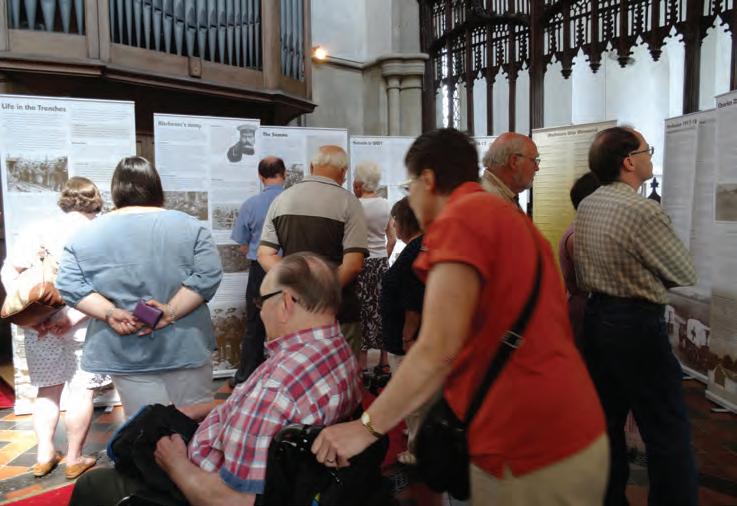
11 minute read
feature
World War 1 Exhibition
19th and 20th July 2014 By Sir David Wright Professional historians can be perplexed by the popularisation of history. They welcome the idea that light should be shed more widely on events of which the anniversaries appear periodically in the calendar. But their well-engrained attachment to careful analysis of data makes them nervous about the risk of popularisation strengthening myth, prejudice and trivialisation.
Advertisement
The centenary of The Great War has furnished ample evidence to support these anxieties. It has been most graphically evoked in a debate over suggestions that certain TV comedy portrayals might provide worthy commentary on historical truth. Thankfully this risk has been countered by more worthy and valuable attempts to analyse the causes of The Great War in a serious, considered, yet accessible manner. There have been excellent television debates in which experienced and talented historians have debated alternative scenarios. The broadsheets have sponsored well researched and balanced supplements. And at the local level, communities have come together to see how The Great War affected the lives, and deaths, of their antecedents.
The work done by the Melbourn History Group, with contributions from their counterparts in Meldreth and Barrington, in the exhibition in All Saints Church over the weekend of 19-20 July stands as a fine example of the application of local historical research and data collection at this time of reflection and memory. Members of local communities, who attended the exhibition in substantial numbers, showed a touching combination of appreciation and engagement in what had been prepared for their scrutiny. The local historians who took on this challenge scrutiny. The local historians who took on this challenge deserve applause and gratitude for what they achieved. The exhibition was well planned and executed. It combined high level historical explanation of the background to and conduct of The Great War and at the same time well researched local level involvement in both the times of the conflict and its impact on local communities. Naturally the exhibition had to have a visually arresting panel of description of life in the trenches. But it sought to go much further than the familiar. It was particularly striking and relevant that at the same time as giving a full chronology of the main events of

continued on page 14









The Great War, it wove into this chronology further panels giving the chronology of events in the villages throughout the length of the war. This chronology sought to record the enlistment and also the sad deaths of young men from the villages in the conflict. These exhibition panels personalised the lives and deaths of particular young men but also dealt with “the home front”. And in that respect, many will have been intrigued by information about, Melbourn’s debate and commitment about assistance to families of Belgian refugees, local hospital facilities and the work to which German prisoners were put locally.
These panels of detailed information on local issues also appropriately reflected on the role of local agricultural workers when enlisted in dealing with the vast numbers of horses which were employed in drawing carts, gun-carriages and provisions to keep the Front supplied. The role of the horse in The Great War on both sides, and more so for the Germans and Austrians even than the British, is an important reflection on the nature of the society which was drawn into the activities to support the War Effort. Interesting to read one specific panel about Charles Dodkin, whose descendants still live in the area and who was conscripted to do just that: to use his talents as a horse keeper to manage horses at the front until sadly he met his death.
In contrast, interestingly enough, was the absence of material in the exhibition about the role of women in that War Effort. This was not a failure of research but a reflection of the society of the time which paid no attention to the role of women in the way which was subsequently cultivated in respect of the Second World War. In Melbourn and Meldreth, despite exhaustive efforts, no material could be found to display this aspect.
Balancing these representations of The Great War were two panels giving accounts of the visits to the Flanders battlefields of young people from Melbourn Village College. In all 120 students paid these visits and contributed to these display panels. This link to the present day is essential on this significant anniversary.
Many families allowed the History Group to display the possessions of their forbears which had been passed on down the generations. This helped to enhance the personal proximity between the exhibition, those whose lives it recorded and the families which had preserved and cherished the memories which these possessions embodied. It was good also to note how the organisers had ensured that the exhibits were clearly labelled and attributed to those who had been involved in the exhibition’s organisation. And a voice from the past was visible in the collections of cigarette cards from private collections portraying features of the conflict and the troops engaged. Though lost, perhaps thankfully, from today’s everyday life, cigarette cards were a common feature of life in the first half of the 20th Century and evocative in their manufacture to support the commitment of the troops in France and also, as the exhibition showed, beyond the Western Front.
So a vote of thanks and applause to a significant village effort which brought history and global events down from the high level analyses of our TV historians to the daily impact of The Great War on the life and doings of a community in Cambridgeshire. And also that effort recorded thanks to the work of local volunteers – even down to the cakes and tea which sustained the many visitors!

exhibits were clearly labelled and attributed to those who had been involved in the exhibition’s organisation. And a voice from the past was visible in the collections of cigarette cards from private collections portraying features of the conflict and the troops engaged. Though lost, perhaps thankfully, from today’s everyday life, cigarette cards were a common feature of life in the first half of the 20th Century and evocative in their manufacture to support the commitment of the troops in France and also, as the exhibition showed, beyond the Western Front. effort which brought history and global events down from the

Photographs by Jan Simmonett
In Memory
by Howard T N Ussher 11th November 1938 Within the Book of Memory Are scented leaves grown dry: But love for those who gathered them Can never, never, die. Somewhere in France those roses bloomed, Somewhere in France they died; Somewhere, beneath the arching blue, Two graves lie side by side. Son of a peasant, son of a peer, They sleep the same long sleep: The angel of God will waken them When He calls men from the deep. We cherish the leaves which link the lands Of Britain and Brittany; Together, we bow and worship God, As we chant Love’s litany. The Rev. Us her was Minister of the Baptist Church in Melbourn from 1937 to 1948. This poem, published in the Independent Press in 1938, on the eve of the Second World War was given by Joan Gane of Meldreth.
Melbourn Mobile Warden Scheme
Can we help you? Can we help a relative? Can we help a neighbour? Who does the Scheme help?
The scheme is open to anyone who requests our help including those who live alone or with their families but need the extra support offered by our services. Couples too are most welcome. It is also open to those in sheltered housing, as the scheme offers different, but complementary services. Note: The scheme also offers its services for short periods to cover the temporary absence of relatives who otherwise provide this support. We offer help with:
•Friendship and support via twice weekly visits and daily phone calls • Ordering and collection of prescriptions • • • • • • Basic shopping Collection of pensions Setting up Lifeline service Bereavement support Advice on benefits Going to the Post Office to pay your bills • Advice on getting repairs done in your home • Arranging transport to the hospital or other appointments • Just coming round for a chat What will it cost?
We do have to make a small weekly charge for the warden’s services. The fee is only £5 per week (a little more for couples). Margo Wherrell (Mobile Warden) 01763 260966 Mobile: 07935 315497 Email: tigress270549@aol.com Jeannie Seers (Deputy Warden) 01763 262651 Mobile: 07808 735066 Email: jeanseers1@ntlworld.com Joy Hyde (Assistant Warden) 01763 220139 Mobile: 07952 090089. Melbourn Warden Scheme is a registered charity. Do you care for someone?
A carer is a person of any age – adult or child – who provides unpaid support to a partner, child, relative or friend, who could not manage to live independently, or whose health and wellbeing would deteriorate without this help. Those receiving this care may need help due to frailty, disability or a serious health condition, mental ill health or substance misuse.
Cambridgeshire’s Carers Away Day 2014 is being held on Friday 3rd October from 10am to 4pm at the Marriott Hotel in Huntingdon. This free annual event provides carers with the opportunity to take part in informal discussion groups with expert speakers, relax, get creative and have fun by taking part in a range of afternoon activities, and to visit the marketplace of information and advice stands. Lunch and refreshments are provided.
This is an opportunity to meet other carers and share your stories and experiences. Places are limited so please book early to avoid disappointment. To book your place at the Carers Away Day 2014 contact the Carers Support Team on 01480 377616 or by emailing: CarersSupportTeam@cambridgeshire.gov.uk **There may be support for carers to attend the event so please ask for any assistance you might need to enable you to come.
For more information about the day visit www.cambridgeshire.net
Saving Money on Your Heating Oil
With over 17,000 homes off the gas grid in South Cambridgeshire, many families in our community use oil to heat their homes. If you’re on oil and looking to make a saving on your next order, check out our useful tips for smart, simple ways to cut down your costs! 1 Watch the weather: Oil prices typically decline during spring and summer, when temperatures are high and demand is low. By topping-up your tank this summer, you can take advantage of these great prices and stay warm in winter for less. 2 Compare prices: Shop around or use an instant, impartial comparison service such as BoilerJuice, to make sure you always get the best quote for your oil. 3 Buy in bulk: Instead of topping-up your oil levels on a regular basis, fill your tank in one go to cut down on delivery costs and get a great bulk-buy price. 4 Order early: Set a regular reminder, mark it on your calendar or simply plan ahead of time to beat the rush, avoid costly emergency orders and take advantage of cheaper delivery options. 5 Add an additive: An inexpensive way to upgrade your fuel, oil additives prevent tank sludge build-up, improve overall efficiency and save you money by reducing expensive maintenance costs, operating problems and boiler breakdowns. 6 Protect your tank: Protect your oil supply against theft by monitoring your levels regularly, installing security lights and using a padlock to secure the entrance to your tank area. 7 Sign up for email alerts: Sign up to newsletters and email bulletins with an independent oil price comparison site to be the first to know about any seasonal offers, vouchers or price drops.
CAB
Question: HMRC has just contacted me to say that I owe them money as they have overpaid my Tax Credits. I didn’t realise that this could happen, and I don’t have enough money set aside to pay them back. What should I do? Our advice: Tax Credits are designed to give working people a little bit of extra income to help guarantee a decent standard of living from work.
Unfortunately, the system by which entitlement to Tax Credits is decided is complicated and can often lead to people falling into debt when they are asked to


• Four lane high wavy slide in funky cow print • Tube slide • Farm themed balance beams • Duck pond ball pool • Dedicated toddlers’ area with mini wavy slide • Mini ball pool for tactile play • Party packages and two party rooms catering for between 10 and 25 children • Cafe with homemade food
Loyalty card rewards card rewards for regular visits visits
BURY LANE FUN BARN
A10 Bypass, Melbourn Royston, Herts, SG8 6DF Telephone 01763 260418 www.burylanefunbarn.co.uk Mon - Sat: 9am - 6pm Sunday: 10.30am - 4.30pm
TTP Group plc
Celebrating 25 years of DEVELOPING

disruptive technologies
www.ttpgroup.com








